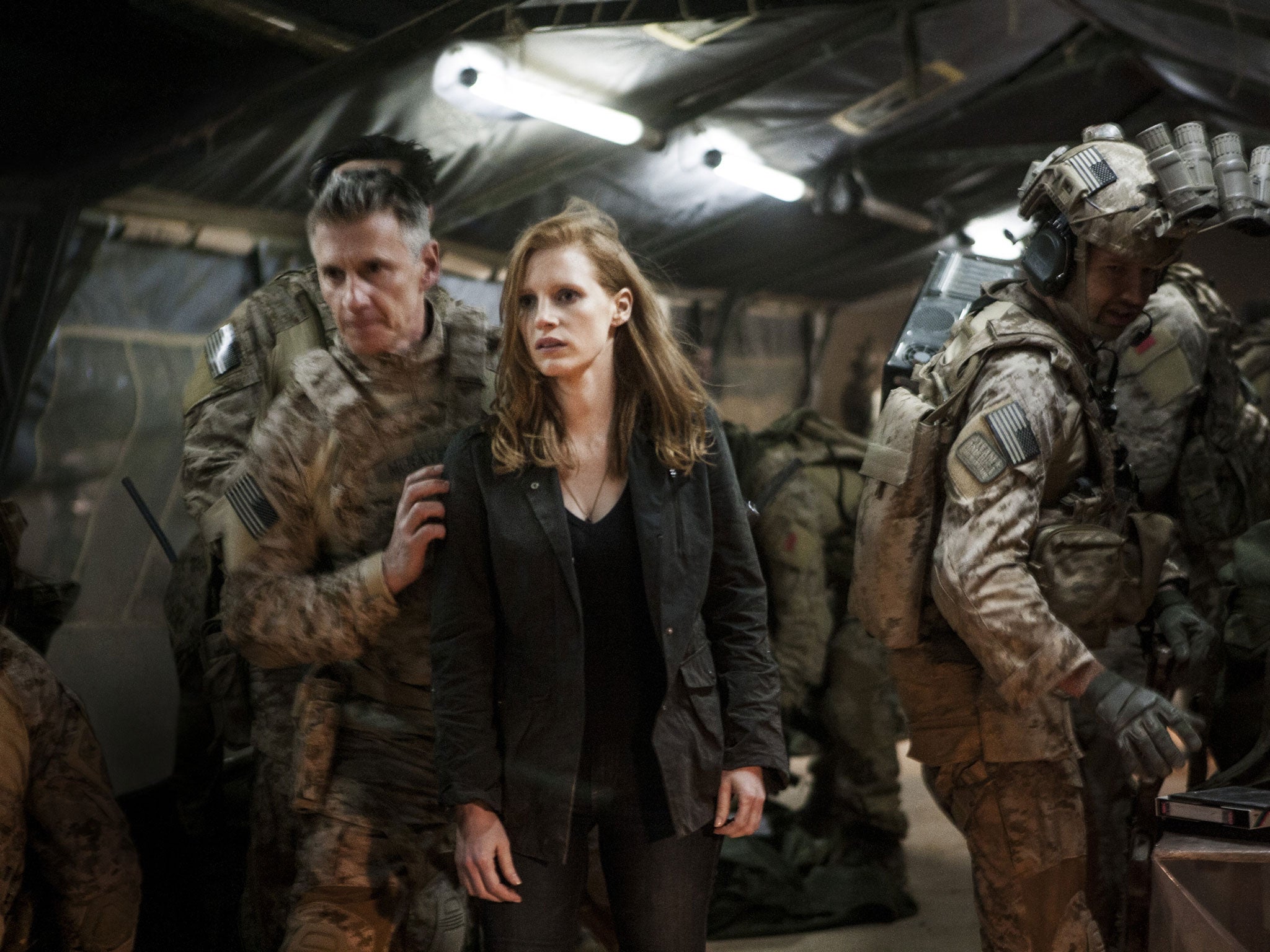Jonathan Romney on Zero Dark Thirty: Bin Laden hunt opens a whole can of worms
Bigelow's drama about CIA's search for Osama raises torture, but ducks all the tough questions

Kathryn Bigelow's Zero Dark Thirty is a powerful, superbly executed war drama; it's also Exhibit A in the current debate about Hollywood's representation of US foreign policy.
Bigelow and screenwriter Mark Boal (her collaborator on The Hurt Locker) had been preparing a film about the CIA's continuing hunt for Osama bin Laden. Then, in May 2011, the news came that he had been located and killed by US Navy Seals. The film-makers reacted promptly – their drama now ends with a detailed recreation of the raid on Bin Laden's Abbottabad compound in Pakistan.
This makes for an immensely vivid climax to a taut espionage film, but the controversy arises from its earlier content. It is suggested that Bin Laden was found thanks to information extracted by CIA investigators using "enhanced interrogation" methods – torture, that is. The film has been criticised for overstating the usefulness of such methods, and indeed for endorsing torture. Conversely, Bigelow has been praised for making a brave, subtle film that forces its public to confront difficult questions about military expediency.
Zero Dark Thirty is certainly open to interpretation. After a prologue in which we hear recorded voices of people about to die in the 9/11 attacks, we cut to a US base where CIA officials Dan (Jason Clarke) and Maya (Jessica Chastain) are overseeing the interrogation of a prisoner, Ammar (Reda Kateb). Ammar is strung up, waterboarded, stuffed into a box, but almost as shocking as the violence is Dan's flip, macho insouciance: "This is what defeat looks like, bro." Maya, apparently new to the game, initially recoils, but she'll get used to it. As Chastain plays ever more inscrutably hard-boiled behind her aviator shades, the film becomes Maya's apprenticeship in torture – ours, too.
The process seems to pay off: Ammar provides what turns out to be a good lead. In fact, he yields it while the Americans feed him dates at table, now playing nice guys; it's their relaxed chumminess after the brutality that makes their approach all the more shocking. Up to this point, Zero Dark Thirty could be read as a bitter indictment of US tactics.
But as the film progresses, its argument, we sense, is that America is obliged to play hardball. Bigelow chronicles the 2008 Islamabad Marriott Hotel attack, 7/7 in London, and a car bomb that kills some of Maya's colleagues. Zero Dark Thirty now becomes a sort of one-woman revenge story.
We know that Bigelow loves the tough, the determined. The people who command our attention throughout this film are no-bullshit types such as grizzled Dan and Joel Edgerton's Seal commander – men with invisible cheroots jammed in the corners of their mouths. And Bigelow especially identifies with tough women. Maya is the ultimate Bigelow heroine: icy, a living homing device, a woman with an element missing – but that's what makes her a superb agent. She's defined by monomania, absolute certainty, her willingness to confront superiors. When CIA director James Gandolfini is informed about Bin Laden's hideout, she barks: "I'm the motherfucker who found this place – sir!"
Bigelow stands with the unshakeable wills of those with sand on their boots – and against namby-pamby prevaricators behind desks. When an official says, "The President is a thoughtful, analytical guy – he needs proof", that's tantamount to calling him a wuss. At one point, Maya gazes dispassionately at a TV broadcast of Barack Obama saying: "I've said repeatedly that America doesn't torture." But when films show TV clips of politicians, they tend to ironise their words: the implication here is that we're living in a world in which such lofty talk is devalued. Zero Dark Thirty becomes yet another film about America's "loss of innocence", its implicit message: "Look what the world has forced us to become".
In the climactic Abbottabad sequence, Bigelow and cameraman Greig Fraser mesmerisingly orchestrate night vision and darkness, silence and bursts of cacophony. We see terrified children huddling, women shoved aside, men summarily shot dead and, with almost incidental brusqueness, the number-one target being dispatched. It's no big deal, a job done – but sombre strings and a shot of one soldier looking troubled encourage us to ask whether all this was worth it. Finally, a teary-eyed Maya flies home alone, whether upset or exhausted – either way, she's photographed to look iconic, a Madonna of unconditional conviction.

Watch Apple TV+ free for 7 day
New subscribers only. £9.99/mo. after free trial. Plan auto-renews until cancelled.
ADVERTISEMENT. If you sign up to this service we will earn commission. This revenue helps to fund journalism across The Independent.

Watch Apple TV+ free for 7 day
New subscribers only. £9.99/mo. after free trial. Plan auto-renews until cancelled.
ADVERTISEMENT. If you sign up to this service we will earn commission. This revenue helps to fund journalism across The Independent.
Despite the makers' claims of detachment, of simply recording facts, this stylistically dynamic film doesn't feel detached in any way. Whether or not Bigelow and Boal directly endorse torture, they certainly naturalise it – make it seem a given part of the contemporary world and one that you'd better learn to live with, bro. It's a short skip from there to suggesting that – to paraphrase a recent notorious argument against US gun control – if you're facing bad guys with bombs, then you need good guys with thumbscrews.
Critic's Choice
Two shots of the everyday, two terrific pairs of performances. In The Sessions, John Hawkes plays a disabled man confined to an iron lung who enlists the help of a sex surrogate, Helen Hunt, while Michael Winterbottom's Everyday sees John Simm and Shirley Henderson wrestle with the realities of prison life and families.
Join our commenting forum
Join thought-provoking conversations, follow other Independent readers and see their replies
Comments
Bookmark popover
Removed from bookmarks